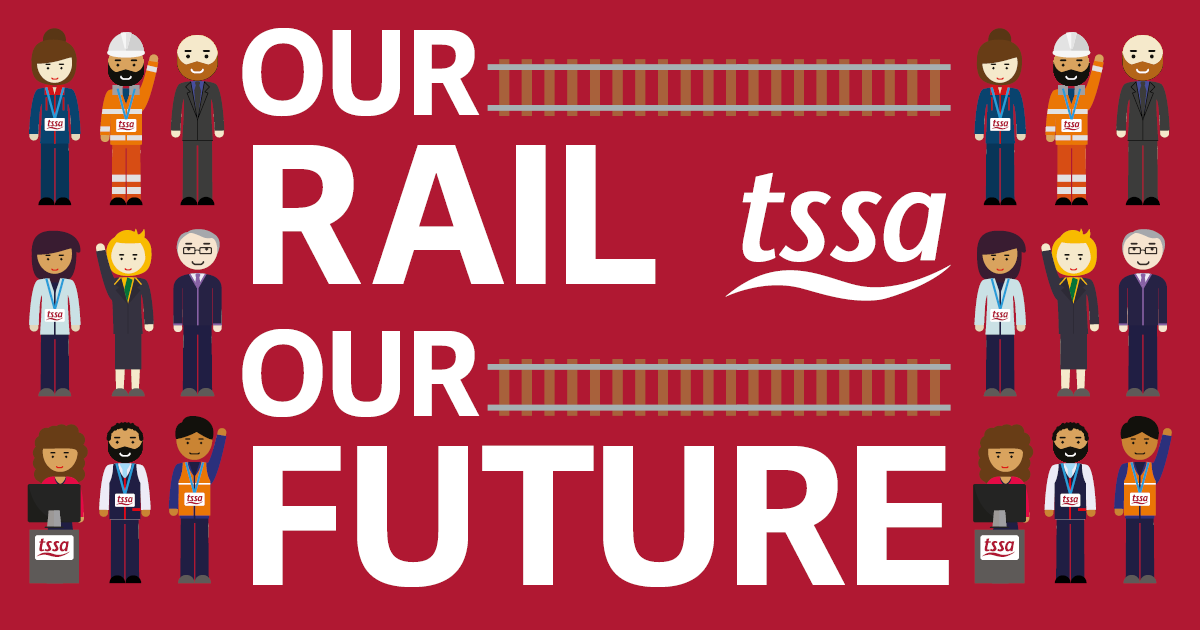NEWS.CATEGORY: Political
TSSA accuses government of “peddling lies” over rail dispute

Ahead of a speech by Transport Secretary Grant Shapps this morning (Thursday), rail union TSSA has accused Boris Johnson, Grant Shapps and the Tory government of “peddling lies” about the rail dispute.
TSSA provides a myth buster and a case study of a rail worker quitting to work for better pay and security at retailer Lidl.
Ministers have called for unions to ‘go back to the negotiating table’, but the Department for Transport itself is not allowing train operators to make pay offers or guarantees on job security. Government officials have called strike ballots “premature” despite TSSA having been in lengthy dispute resolution meetings with employers trying to avoid industrial action. Added to this, government officials are trying to paint rail workers as highly paid using a figure of £59,000 but the reality is that TSSA members being balloted include customer service workers on £18,800 and station staff on around £24,000.
TSSA General Secretary Manuel Cortes said: “Ministers have resorted to peddling lies about the rail dispute, but that’s what you expect from this Johnson-led government.
“While they call for unions to go to the negotiating table, the government’s own instructions are preventing train operators from making any pay offers or assurances on job security. Calling for unions to negotiate while at the same time not allowing any pay offers is utter nonsense.
“It’s in the gift of Shapps and Sunak to resolve this dispute by meeting the reasonable demands for job security and a fair pay rise for rail workers. The ball is firmly in the government’s court.”
Myth buster
Claim: “not negotiating”
On Tuesday 14 June 2022, the Prime Minister’s spokesperson said: “It is our firm view that unions are skipping over a step, they’re not negotiating, they are moving straight to strike action. The Government is doing everything possible to encourage unions to step back from the precipice of this and we want the negotiations to proceed.”
Reality: DfT not allowing negotiations
The Department for Transport is not allowing train operators to make pay offers or guarantees on job security. The DfT plays a direct role in the running of rail services delivered by TOCs and mandates what the companies are allowed to do. Pay talks and negotiations with TOCs have taken place, but it’s been made clear that no train operator is permitted to make an offer on pay or job security, calling into question what can be achieved through ‘negotiations’ with employers.
TSSA has sought out negotiations on pay and job security with Network Rail and the union has attended all meetings. When these failed, dispute resolution meetings were attended but failed to reach a way through. A pay offer of 2.5% for some – not all – TSSA members was made but it falls far below RPI inflation which is 11%. The staff offered the pay rise have not had an increase since 2019.
The decision to ballot for industrial action was taken by reps in companies as a last resort and after the failure of protracted meetings. Meetings are continuing.
Claim: “Premature” action
On Tuesday 14 June 2022 a Department for Transport Spokesperson said: “Strikes should always be the last resort, not the first, so it is hugely disappointing and premature that the TSSA is balloting for industrial action when talks have only just begun.
“We urge the TSSA to reconsider and come to industry talks, so we can find a solution that delivers for workers, passengers and taxpayers alike.”
On the same day, Network Rail issued a media statement calling the TSSA ballot “premature”.
Reality: protracted talks
TSSA put in a pay claim to Network Rail in December 2021. After multiple attempts to secure pay meetings with the company, TSSA moved the issue ‘into dispute’ (an industrial relations term) in April 2022. Only following this did Network Rail offer dates for pay meetings.
TSSA has put in timely pay claims to all train operating companies, attended meetings and sought to reach a deal on pay and job security.
Claim: Rail workers are paid highly
On Tuesday 22 June, the Prime Minister’s spokesperson said: The median pay of rail workers is significantly higher than other public sector workers, with nurses receiving a median of £31,000 compared to £59,000 for train drivers.
Reality: many rail workers are low paid
Many rail workers are low paid. TSSA members working for LNER in customer solutions in Gosforth are paid just above the minimum wage (£18,805 compared to the NMW at £18,278) – a salary so low that they were taken out of the pension salary sacrifice scheme when the NMW increased this year because it would have taken them below the legal NMW. Many station staff are on salaries of around £24,000.
The figure used by the government is deliberately misleading and gives a false impression of the pay of those across the railways. However, rail bosses are on some of the highest pay packets in the country, with Network Rail CEO Andrew Haines on £590,000.
Nurses deserve a pay rise – this is not ‘one or the other’. The government is trying to divide workers and pit them against each other. TSSA believes all workers deserve a pay rise.
CASE STUDY: Leaving the railway for better conditions in Lidl
Gemma, a member of station staff working for Southeastern, is considering leaving the job she’s done for the past eight years to work in Lidl on similar pay and safer working conditions.
“It’s not the job I started, it’s changed so much in a short space of time” she explained.
As platform staff, Gemma’s salary is around £24,000. She could earn £13.80 an hour stacking shelves on nights in supermarket chain Lidl in what she considers to be a “much safer” environment.
The mum of three explained: “Working on stations, you can sometimes be the only person and it doesn’t feel safe. How many times in a supermarket would you have to go and break up a fight? It’s got so much worse, we’re doing it almost on a daily basis. In a supermarket, I would be inside and there would be security so I wouldn’t have the same risks.”
Gemma also said that rumours of ticket office closures, a move to seven day working and lack of pay rises was also behind her decision. “I’m open to change as long as we’re treated fairly, but if they close ticket offices it’ll be awful. We need those staff. They don’t even do timetables anymore – try explaining to a 90 year old they need to go online to find out train times. Not everyone is internet savvy.”
A colleague who also works as station staff at Southeastern added: “Ten years ago these were considered well paid jobs. They’re really not anymore. I know lots of people who are looking for work elsewhere, people are struggling to pay their bills.”

